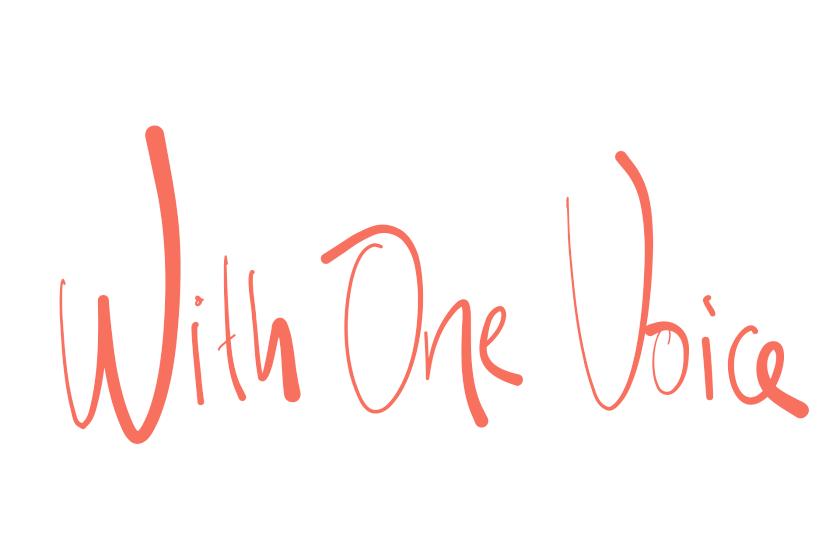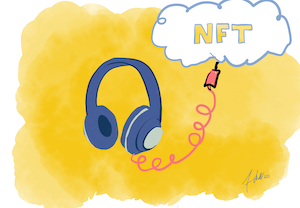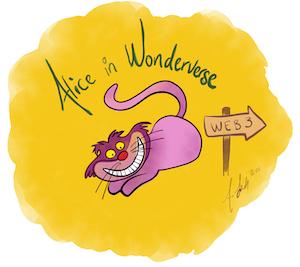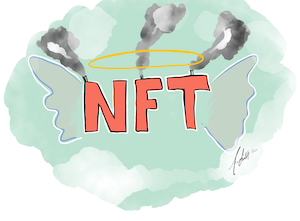
With One Voice - March 2022
Available in English, French, Spanish, and Portuguese
Welcome to the International Council of Music Creators (CIAM)'s newsletter. This month, the continued emergence of NFTs and the Metaverse are front and center. Learn about the upcoming deep dive into NFTs event from CIAM, what the Metaverse has to do with music, and special guest column on NFTs from the Danish composer Anna Lidell.
Sign up to receive the With One Voice newsletter here.

CIAM Online Forum: A Deep Dive into NFTs
When it comes to NFTs, messianic fervor fills the ephemeral air. After decades of seeing the wholesale devaluation of music by piracy, streaming, safe harbor laws and the like, here at last we have the promise of something that can and will bring meaningful value back to music and those of us who create it.
But what exactly are NFTs? What is their legal status? How do they affect copyright and authors rights? Is there a connection between the astronomical multiples some music catalogues are now commanding, and the promise of NFTs? Are they a new way to feed your family, or just another hype driven feeding frenzy?
Not to mention the important question as to the enormous environmental impact block chain and NFTs are having on our endangered planet.
On April 7, we will take a deep dive into all this led by Professor Daniel Gervais, Director of Vanderbilt University Law School’s Intellectual Property Department.
We will also hear from music creators who have embraced NFTs, and have “real world” experiences to share.
Certainly not last nor least, we look forward to hearing your questions, thoughts and experiences with NFTs.
Please join us! We look forward to seeing you there.

Alice in Wonderverse
When Alice fell down the rabbit hole, she never imagined all the adventures she was about to live.
We human beings are about to enter a new world known as web 3.0 (powered by cryptocurrencies and the blockchain), where mysterious but undoubtedly exciting experiences await us, such as the Metaverse.
Sapiens have grown by leaps and bounds, thanks to our resilience and our inexhaustible curiosity and imagination.
This enormous capacity to create always begins with a question.
The one perhaps most intriguing to us is whether the universe that surrounds us exists or is a simulation created by someone else.
The Aztec philosophers thought this planet was a painting, or a book written by Teotl (Father of Life). Some of their Indian peers sensed that our environment was a magical illusion that they used to call ‘Maya.’
Nick Bostrom, one of the most recognized philosophers of our times, recovered this idea and has turned it into a controversial hypothesis, but it was Neal Stephenson who, in his cyberpunk novel “Snow Crash” shows us the Metaverse for the first time.
A virtual world where human beings could interact as avatars to escape a dystopia just like the one we are experiencing today (climate change, pandemics, Putin).
The idea is fascinating, and while today it seems like a three-ring circus, the Metaverse is an industry worth more than a trillion dollars by 2024.
But what does the Metaverse have to do with music?
To begin with, we must understand that the Metaverse is nothing but a simulation of the real world (another simulation?), so then, it is normal seeing concerts by renowned artists or even the sale of unique works and rarities as in the recent case where a DAO bought Wu-Tang Clan’s “Once Upon a Time in Shaolin” for $4 million.
But what is a DAO?
Known as Decentralized Autonomous Organizations, these are groups of enthusiasts who join efforts and money to compete with large corporations that have bought and invest in the Metaverse.
They are the engine behind the revolution that web 3.0 promises to prevent corporations like Meta or Microsoft from ending up monopolizing the system, as they have already done with the Internet.
They are the ones who are driving up the value of music in the Metaverse, where it is already easy to find artists who were born in this place like the NFT band known as KINGSHIP, that ended up getting a juicy contract with UMG.
Decentraland, Somnium Space, or the famous Sandbox, thanks to Snoop Dogg, are places where independent artists and mainstream stars find new fans and much better ways to monetize their work.
Without a doubt, it is too early to guess the future of the Metaverse. Still, I am sure that even imploding in a few years it will revolutionize our industry.
And just as streaming killed the sale of physical albums, the Metaverse will be the end of streaming.
If you don’t believe me, ask Alice, who was never the same, after returning from Wonderland.

Is NFT your new best friend or the worst climate enemy?
There were once two women who both believed that a child was their son. Therefore, King Solomon had to decide which of the two was telling the truth. He gave both women a knife and asked them to split the boy in two and get a half each. One woman shouted stop and said she would like to give the baby to the other woman. Then King Solomon knew who was speaking the truth.
I come to think of this biblical narrative as I read the loud debates for and against the NFT, the struggle for truth! For we have the tendency to think that there is one truth, either the NFT and the decentralized internet is our rescue, the tool to democratize the internet, just as it was promised to do in its infancy. It will be the end of the tech giants' power monopoly and surveillance capitalism, the power back to the people.
Or are NFTs just a new means of power for new monopolies with an engine in the form of blockchain, where each NFT emits as much CO2 as an average European's consumption in a month - in other words NFTs may be the biggest culprit of the climate crisis? (For detailed environmental calculations, see note). Not to mention the international economical sanctions made right now, which would be impossible if everybody had crypto.
Personally, I am not a fan of the great polarizations: the pursuit of one truth, which excludes the other. My view on NFT is equally childish curiosity and healthy skepticism. Basically, I do not yet think we can give stable predictions of what it will mean or what we intend to let it mean. It is a new phenomenon that can still take many forms, and I think it is our responsibility to relate to it and not least to influence it.
But what is NFT?
Just over a hundred years ago, for the first time ever, music could be stored in a wrapper, in a small cylindrical wax-wrapped Edison Record. Relatively soon after came the first vinyl records, and for over 50 years 3-4 minutes was the standard format for music. Funnily enough, roughly the same as what we are used to today for a song to last. When the mp3 file arrived, it was possible for the first time to store music without a container, without a wrapper!
This meant that the music could be copied indefinitely, and today we expect to be able to access virtually all music worldwide from the music streaming platform we subscribe to. It's almost magical - for the listener. It's convenient, but unfortunately with the consequence that those who create the music are no longer paid a fair share of the value of those works. Basically because there is no shortage, all music can be copied indefinitely and all music equally has little worth on streaming.
We see it for example when Lucian Grainge, CEO of Universal, has earned more in 2021 than all English songwriters combined on streaming. Or when Spotify buys former FC Barcelona, now called Spotify Camp Nou, paying 65 million a year, while the songwriters still get less and less for their music. The question is therefore, how to fix streaming? Is it even possible? Or is NFT the solution? And if so, with what consequences?
The format has always influenced the content
Just like the vinyl record meant that for half a century we almost thought it was an objective truth that a song is between 3-4 minutes. My question is therefore: how will the NFT packaging affect the music?
I start by putting on the optimistic hat. NFT is a wrapper that you can use for your music online. You can then offer your NFT on a market such as OpenSea, and every time your NFT is sold, all data is stored in a blockchain. It also means that you can at any time choose to change market platform if you want, i.e. that you are no longer dependent on a platform, but have your data in a protocol, an NFT. This will make it possible for us as creative musicians to regain control of our own works as record companies and intermediaries become superfluous.
That we can now again appreciate our works and get the payment we think is fair, the payment the audience is actually ready to pay and invest in the individual work, the individual NFT. That value can also change over time in the same way that a stock or a painting of the Mona Lisa can change value over time. As long as you publish yourself, you also decide for example whether you want to keep your rights and thus have no greater risk of losing them than if you published your music on Spotify. The Internet is hugely centralized around a few tech giants today who own not only our music but also our data and our access to audiences. Hence the decentralized internet, web3, on which NFT is based, built on activism and community. Here you own your data and your contact to the audience.
There is something co-operative about NFTs and the decentralized internet that appeals to me a lot. It seems more sustainable and long-term. Rather than tech giants, who basically have to make a profit for their shareholders, trading in NFTs is verified by blockchain and the decentralized internet, and what are called DAOs, kind of associations. Just as corporative employee-owned companies did better through the financial crisis, I am also optimistic that there is greater interest and incentive to create sustainable economies because the shareholders are the members themselves. So far so good, so what is my concern?
New tech, same habits
Even though NFT is a new technology, we humans are basically the same. And people tend to repeat what they know. The Internet's first chat room was supposed to mimic physical coffee shops, what we today know as social media. In the same way, I think our tendency to use the same search engine, same platform, etc will be the reality of a transition period. Or the need of some people to collect power and money at the expense of others.
Bitcoins have, among other things, been criticized for the fact that the first owners have made a disproportionate amount of money at the expense of the new ones. All technology suffers from childhood diseases, and so does NFT and blockchain. It can be improved, but of course there is an in built risk. Is it as safe as it pretends to be? We are already seeing big platforms like OpenSea absorb large market shares. Won't it just be the same new tech giants who centralize power in a new infrastructure that strengthens them? I may also be concerned about the huge focus on money and stocks in NFTs. In the same way that I'm frustrated that Spotify is investing in car equipment, sports clubs and podcasts instead of music, I'm frustrated that music is becoming a shortcut for money and not the other way around.
And then there is the whole validation of value, all currency is a representation of value, money always has existed only if we have a collective understanding of and confidence that they are worth something. Right now, the dollar is a reserve for crypto, but what if confidence in the dollar tanks? Or if blockchain worldwide becomes illegal due to climate pollution? Trust takes time to build, and the phenomenon is very new, so we can basically know nothing with certainty. Also, I may be worried that someone is being abused because they do not understand the complexity of NFTs well enough. That they think they can sell shares of their rights for example, without knowing how those rights are to be managed? Or that there will be large commercial NFT rights administrations, which “cherry picks” few great artists at the expense of the collective administration we have today?
I am basically optimistic and curious. I believe and hope that we creative and musical souls will throw ourselves into the new technology and challenge it and use it to challenge ourselves and art. We need to relate to what network we are on and to whom we are handing our power, and if we do, we can also make sustainable demands for fair payment. That said, I'm also not blind to the reality many artists face. One can get short of breath over the need for flexibility when new digital platforms become dominant in less than a year, and a corona pandemic constantly pulling the rug from under one's plans. The need for promotion has not diminished with NFTs, and perhaps we run the risk that it is again those with resources, knowledge and time who gain the upper hand on this phenomenon? Maybe it's majors again who ultimately win here? Or will it save the entire professional music profession worldwide and challenge the current unsustainable payment models?
Artists need to influence
Because these questions are so wide open, it is important that we take an active part in the development if we also want to help shape it. To me, it might call for a Solomonic solution, but it is still too early to answer who rightfully has a patent on the truth. Therefore, this is my snapshot and thoughts on NFT, ask me again in half a year and I will no doubt have gotten wiser.
Note: The climate accounts are complex and dependent on many factors. First, it depends on how much green energy a network is running on, how far away it is, and someone has even researched that the majority of the revenue is used to buy new electronic equipment, so it should count as part of the bill. The second question is, what can one compare it to? The Etherium Network consumes 20 kilotons of CO2 per day according to Kyle MacDonald, which is equivalent to the consumption of 2,500 Danes or 8,000 Indians. I can recommend the following reading to dive deeper into the climate calculations and blockchain.
Kyle MacDonald, researcher and artist who has made thorough calculations that can be seen here. Ethereum Energy Numbers are in! Moral calculations and web 3 critiques with Kyle McDonald | Interdependence
Calculates for how much different countries consume per. per capita, can be seen here: List of countries by greenhouse gas emissions per person - Wikipedia
Guest Columnist: Composer, Autor Chair and KODA Vice Chair Anna Lidell
